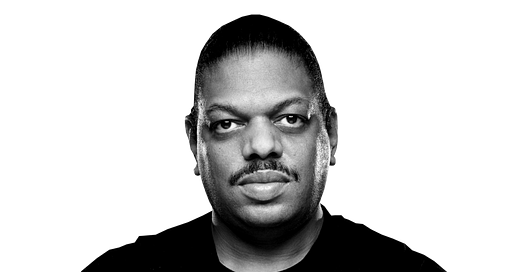Kerri Chandler, via Purple Wall
I didn’t know SWU.FM until recently, though it’s not exactly new(s)—Mixmag announced the reboot of the Bristol station two Aprils ago, the Rinse Group’s second such operation (the other is the former jungle pirate Kool FM). But it didn’t take long to click Subscribe, and my feed grew richer as a result. You can hear for yourself on this SoundCloud playlist, featuring all five sets below.
A screenshot of the SWU homepage.
Ternion Sound (July 22)
So, yes, an update—this was in my queue not too long ago, and here they repeat a couple things from June (they played over 100 tracks on that one; it happens) and a very different beast from it entirely. For one thing, it’s just Jack/Antithesis this time out, and the pacing moves more gradually, the styles just as broadly based but with more kick drum leading the charge—lots of sub-bass but not as prevalent as June. Plus it led me into the others, so it gets circumstantial props as well.
DJ Die Presents Gutterfunk: feat. Randall Archive from Trinity Centre Bristol 1996 (August 14)
From the department of the not-so-recent: This one came on right as I was beginning to fall asleep, but I kept it going while I laid down, and as I woke from my doze more than once during its duration, one thought repeated itself: “This is great.” More sober reappraisals have confirmed this suspicion.
The first 44 minutes are longtime drum & bass DJ Die pulling from the crates, playing tracks that date from around the same time as his primo set piece, and of the same ilk. Then, @ 44:40, he introduces it: “So, like I said, people, it’s time to pause and record. Takin’ it back to 1996 with this exclusive recording, straight off cassette tape, hiss and all—the DJ Randall live at the Trinity Centre, March ’96, the party for Music Box, the compilation on Full Cycle Records. This was a big night, hosted by Dynamite MC and Five-O. Just listen to the vibes on this, man.” It’s @ 45:20. Here comes the archive. (I’ve rendered the title [nearly] the same as it appears on SC, purely for easiness’s sake.)
That Die had this in his possession—he likely played the show himself—tells us a lot about the esteem DJ Randall was held in by his peers. His description is right on target, though the occasional bouts of hiss are minimal sonically. Overall, the sound is clean and full, the low end’s multiple dimensions really coming through. Which also tells us that Die didn’t play the tape to death—lucky us.
The MCs are on exuberant form—they stay out of each other’s way, ride the beats with real professionalism, know when to lean back. The music is minimalist and fun, boisterous and vintage—this was a compilation party, so older songs weren’t verboten the way they’d typically been through the hardcore >> jungle >> drum & bass progression. (In fact, by 1996, D&B DJs in particular were beginning to play nearly as much old stuff as new, though maybe less so if we discount updated remixes of vintage tunes.) But this set still sounds like it’s looking into the future, not the past. Randall’s section ends with five minutes left. What Die surrounds it with sounds fine. But this archival pull is the prize, plain and simple.
Distance (August 18)
I wasn’t aware Distance was still around and kicking; a 2005 session for Rinse FM made my Wire Primer on pirate radio DJ sets, and nearly two decades on, this hour is still in that one’s realm. The music has a simple but deadly affect—like dubstep’s Americanization never happened, doomy and musical—that still knocks hard. And I say “affect” because the musical reality is that this set does, indeed, reflect the changes of the past twenty years, namely the heavy gouge-the-earth b-lines that became lingua franca long ago. All of it, including the stuff he didn’t make, still sounds distinctly like Distance; he’s as down-the-middle pleasurable to me as, oh, Lone.
Hodge b2b Pev, Live at Strange Brew (August 26)
The final two hours from an all-night club set recorded two weeks before—“a vibey night, a sold out one, so it was really busy, smoky . . . Sometimes you get one of those in the summer where everything just clicks.” It kicks off very summery—high Fender Rhodes chords offering aural sunshine, uncluttered kicks and bass like the earth absorbing the sun. By the final third or so, the drums are tougher, the bass lines more rigid, the vocals more insistent, never more lusciously so than the a cappella “Freak Like Me” (no, the other one) that bridges a couple of small but potent drum dioramas. So fun.
Kerri Chandler, 20 Years of Roasted (August 31)
“Bass heavy” in the kicker meant “bass music,” in the UK sense—sound-system music heavy on low end with its roots in both Jamaica and Black America; the Reynoldsian hardcore continuum. Soulful East Coast garage is an early point of that line, but this hour sounds unlike any of the above and fits this grouping anyway—a reminder not only of where it all comes from but of what it all means. There’s a lot of disco in here, nowhere more headily so than a kaleidoscopic “Asunder” cut-up, but it doesn’t let up at any point. Kerri Chandler isn’t just doing trad-house, but apotheosizing it.




